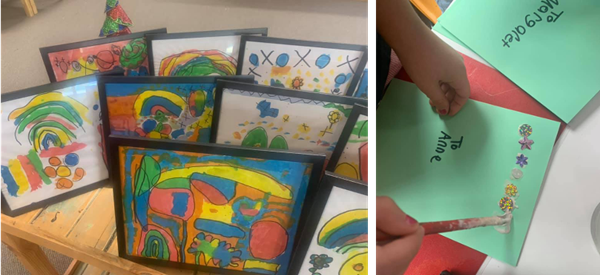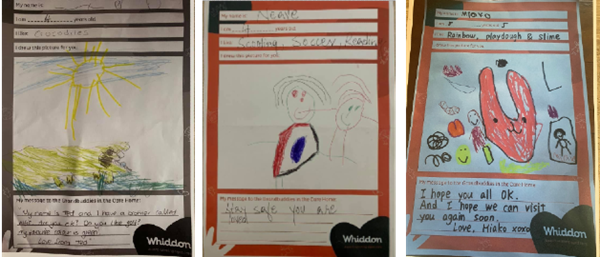During the COVID-19 pandemic, many elderly residents of care homes have been left feeling more alone and isolated than ever – particularly those with no relatives to talk to via phone or digital devices. Research1 has found that perceived social isolation and loneliness are associated with depression, cognitive decline, poor sleep quality, a weaker immune system, and potential heart problems, making relationships a vital tool in helping the elderly survive through this challenging time.
After building relationships with residents at their local aged care facility, the children at Redhead Community Preschool were disappointed when their scheduled morning tea visit was cancelled due to the pandemic. Brett Dwyer, relationship manager at the care facility knew that something had to be done urgently to revive connections, leading to the creation of the ‘granbuddies’ program, a COVID-safe social program to reunite the children with their elderly friends.
We spoke to Redhead Preschool director Louise Perrett to find out how it has benefited both young and old.
Festive visits lead to firm friendships
Last year, one of the preschool parents, who has worked in supporting residents at the town’s local nursing home, told Louise that many residents would be alone and without family at Christmas time.
We talked about this with the children and the empathy and compassion that was shown by the children was phenomenal,” shares Louise. “The children were genuinely sad and concerned and knew they had to do something.
The children created cards and painted pictures for each resident and framed them. Families were invited to the nursing home (Whiddon Aged Care) on Christmas Eve and gifts were presented to the residents who were all alone.

According to Louise, it was a very moving and emotional day which resulted in a strong bond between the children and the elderly residents. Letters continued to be exchanged and the children visited once more for morning tea. Just as another visit was scheduled to happen, the pandemic began and plans had to be put on hold.
Maintaining strong connections with families
During the pandemic the team at Redhead maintained strong connections with families through the preschool’s Facebook page, launching a ‘stay connected’ online learning plan.
The plan consisted of each educator presenting a specific experience each day for the children. This included familiar songs and dances, cooking and art, “being in the moment in our yarning circle” and singing our acknowledgement to country, which is part of the children’s daily morning routine. Free parent webinars on a variety of topics including how to manage isolation, homeschooling and self-care were also shared.
“I also posted regular video updates from me, which explained our response, updates and management plans and more recently, our staggered return to preschool plan,” shares Louise. ‘The response from our families online was huge. This created a wave of reciprocal videos sent in the form of the children following up on activities and experiences we had prompted them to try at home, from cooking, to playdough making, to art experiences.“
While educators and families had quickly found a way to remain connected, the friendships they had built at their local care home just last Christmas were at risk.
The Granbuddy program reignites safe connections
“Brett from Whiddon Aged Care contacted me and commented that the residents were feeling very isolated and lonely in lockdown,” recalls Louise. “We knew visiting was out of the question, but the facility put forward the Granbuddy Program and we jumped at the opportunity. Physical distance doesn’t have to mean disconnection.”
The program links children with elderly care home residents through art and letters. In order to facilitate an easy exchange, the team at Whiddon created a template for families to use. The letters and artworks were scanned in and emailed to residents to avoid any cross-contamination. The team at Whiddon print the letters and images to share with residents and decorate the walls.

“The Granbuddies program is of great benefit to the children as within our philosophy and through our practices, we believe in children’s agency and that children are advocates in their learning and being, meaning they know they can make a change and a difference within their immediate and wider community,” shares Louise. “They see that their actions and kindness can make a difference to others.
“The children have connections with the residents, so they are connecting with people they know and care about. In a time where the children have not had any control over current circumstances, they know that taking action and sending a letter to a resident is something they are a part of and can have control over. Our Preschool community has a huge heart and our families have embraced this program wholeheartedly. We look forward to a day where we can visit the residents once more.”
Ready to welcome children back and do their bit to keep the curve flat
When asked about the government’s easing of restrictions, Louise says that she’s feeling cautiously optimistic.
“I’m looking forward to seeing our children and families as we have missed them all so much. But at the same time, I’m very aware of ensuring we are implementing our practices and monitoring the health of our children and educators.
“We have a whole range of measures in place, which means we are doing everything we can to keep everyone as safe as possible. We have a COVID-19 Policy, we have conducted a risk assessment and have a formal management plan in place. We are following guidance from NSW Health and our Regulatory Authority and we are transitioning the children’s return in a staggered way.
“We are hoping that everything we have in place will ensure we are doing our part in keeping the curve flat. Moving forward, we will all just need to adjust to a new type of normal.”
References:
- Perceived social isolation, evolutionary fitness and health outcomes: a lifespan approach
Louise C. Hawkley and John P. Capitanio | Published:26 May 2015 https://doi.org/10.1098/rstb.2014.0114
About CELA
Community Early Learning Australia is a not for profit organisation with a focus on amplifying the value of early learning for every child across Australia - representing our members and uniting our sector as a force for quality education and care.